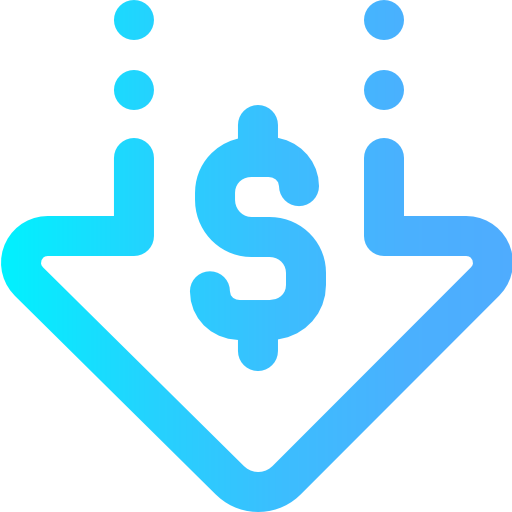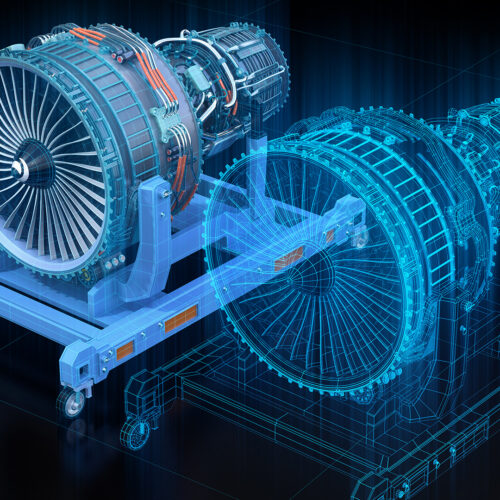Often an area with lower focus, the Internal Operations of a company determine the true success of an enterprise. The Intelligent Industrial Web (IIW) can significantly enhance the productivity, efficiency, and outcomes of internal operations as means to achieve higher enterprise value.
Enhancing Internal Operations to Maximize Enterprise Value & Efficiency.
Maximizing Enterprise Value with Operational Enhancements
Effectively managing the internal operations of an enterprise requires strong leadership, effective communication, and the ability to adapt to changing conditions. There are a number of challenges that enterprises may face when it comes to their internal operations. Large enterprises often have complex operations, with many different departments, processes, and systems. Managing this complexity can be a challenge, as it requires coordination and communication between different teams and functions. Add to that, outdated or inefficient processes and systems can slow down the flow of work and hinder productivity. It can be difficult to get employees to adopt new technologies or processes while also adhering to strict regulatory requirements, which can be complex and time-consuming to manage.
This is where the Intelligent Industrial Web (IIW) comes into the picture. The IIW helps organizations of all sizes solve the challenges of today while effectively planning and adopting futuristic regimes. The IIW was designed keeping in mind the needs of the organizations and a requirement to deploy stable, secure, scalable and culturally appropriate technological solutions.
Increased Operational Efficiency
The Intelligent Industrial Web (IIW) can help automate tasks, streamline processes, and reduce the need for manual labour, resulting in increased efficiency and productivity. Advanced tools can significantly boost communication and collaboration between employees, improving the flow of information within the company beyond the use of standard applications.
Advanced analytics tools can help companies collect, analyze, and interpret data, enabling Managers to make data-driven decisions and improve their operations. Overall, the adoption of IIW can help a company become more efficient, agile, and responsive to the needs of its customers and employees.
Lowered Costs
The IIW can enable employees to work remotely, improving work-life balance and giving companies the ability to tap into a wider pool of talent while reducing overhead. Additionally, it can help optimize supply chains and reduce the need for manual labour resulting in cost savings for the company.

Improved Consumer Output
IIW can help companies manage and improve their relationships with customers, through a variety of internal functions that boost touchpoint innovations.
Bringing Industrial Intelligence to Internal Operations
Navigating the rapidly changing business environment with you.
Future strategy consulting is an engagement model of Cosdec Alpha that helps organizations plan for the future by providing consultation on how to navigate a rapidly changing business environment. This can involve analyzing trends and forecasting future developments, identifying opportunities and risks, and developing strategies to take advantage of opportunities and mitigate risks.
Future strategy often involves a variety of activities, including market research, financial analysis, scenario planning, and stakeholder engagement. It also involves the development of strategic plans, technology plans, and other documents that outline a company’s long-term vision and goals.
Some key factors that may influence the development of a future strategy include technological trends, market conditions, regulatory changes, and social and political developments. To be effective, a future strategy must be flexible and adaptable, able to respond to changing circumstances and take advantage of new opportunities as they arise.
Overall, the goal of future strategy consulting is to help organizations make informed decisions about their future direction, positioning them for success in an increasingly complex and dynamic business environment.
Automating processes for higher operational throughput.
Workflow automation is the use of the Intelligent Industrial Web (IIW) to automate and streamline business processes and workflows. It involves the use of software tools and technologies such as AI/ML to automate repetitive tasks, freeing up time and resources that can be better spent on higher-value activities.
Workflow automation can be applied to a wide variety of business processes, including data entry, document management, customer service, and financial reporting. It can be used to improve efficiency, reduce errors, and increase the speed at which tasks are completed.
There are many different types of workflow automation tools and technologies available, including business process management (BPM), robotic process automation (RPA) tools, and integration platforms. These tools can be customized to meet the specific needs of an organization and can be integrated with other systems and software to facilitate seamless and efficient workflows.
In addition to the technical aspects of workflow automation, it is also important to consider the organizational and cultural changes that may be necessary to successfully implement and maintain automated workflows. This may include training employees on new tools and processes, establishing clear roles and responsibilities, and defining protocols for handling exceptions and deviations from the automated workflow.
Bringing Innovation to Product Development & Management.
The use of the Intelligent Industrial Web (IIW) involves the collection, analysis, and interpretation of data from a variety of sources, including sensors, machine logs, and production data, to gain insights and drive decision-making.
By collecting and analyzing data on how products are designed, manufactured, and used, companies can identify opportunities for improvement and optimize their product development processes. This can involve everything from identifying the most popular features of a product to understanding how customers use and interact with a product, and using this information to inform the design and development of new products.
IIW can also be used to optimize manufacturing processes and supply chain operations, helping companies to reduce costs, improve quality, and increase efficiency. By combining data from different sources, companies can identify bottlenecks, optimize production schedules, and improve the overall performance of their operations.
Overall, the use of industrial intelligence can help companies to drive innovation and improve their competitive position by leveraging data and analytics to optimize their operations and drive product development.
Utilizing the most important asset of an organization smartly.
In the realm of People Operations and HR, the Intelligent Industrial Web (IIW) can be used to optimize and improve a variety of HR processes and activities. For example, it can be used to analyze employee data and identify trends and patterns that can inform the development of HR strategies and policies. This can include things like analyzing employee turnover rates, identifying factors that contribute to employee satisfaction and retention, and developing training and development programs to address identified needs.
The IIW can also be used to optimize People Ops processes such as talent acquisition and performance management. By analyzing data on job performance, skills, and career development, HR leaders can identify high-performing employees and target their recruitment and development efforts accordingly.
Overall, the use of IIW in People Ops can help organizations to make data-driven decisions about their workforce, leading to improved efficiency, productivity, security, and employee satisfaction.
Making Cybersecurity intuitively proactive, not reactive.
In the area of cybersecurity, the Intelligent Industrial Web (IIW) can be used to optimize and improve the security of enterprise systems and networks. This can involve the collection and analysis of data from network logs, security sensors, and other sources to identify potential security threats and vulnerabilities.
Using IIW techniques, organizations can develop predictive models that can help to identify potential security threats and take proactive measures to prevent them. For example, machine learning algorithms can be used to analyze network traffic patterns and identify anomalies that may indicate a potential attack.
In addition to improving the security of industrial systems and networks, IIW can also be used to optimize incident response and recovery efforts. By analyzing data on past incidents, organizations can develop strategies to more effectively respond to and recover from future security breaches.
Overall, Intuitive Cyber Intelligence systems can help organizations proactively identify and mitigate security threats, improving the overall security posture of their industrial systems and networks.
Setting new operational benchmarks for enterprise infrastructure.
The Intelligent Industrial Web (IIW) can be used to optimize and improve a variety of systems and processes. For example, it can be used to analyze data on network and server performance to identify bottlenecks and other issues that may be impacting the performance and reliability of the infrastructure.
Using IIW techniques, organizations can develop predictive models that can help to identify potential issues in advance of their occurrence, allowing them to take proactive measures to prevent disruptions. For example, machine learning algorithms can be used to analyze server logs and identify patterns that may indicate a potential failure, allowing organizations to take preventative maintenance measures before the failure occurs.
In addition to improving the performance and reliability of enterprise technology infrastructure, IIW can also be used to optimize resource allocation and optimize costs. By analyzing data on usage patterns and resource utilization, organizations can identify opportunities to optimize their infrastructure and reduce costs.
The use of the Intelligent Industrial Web in enterprise technology infrastructure overall can help organizations to optimize their systems and processes, improving performance, reliability, and efficiency.
Improving decisions and performance in real-time.
Internal intelligence refers to the use of real-time data and analytics to optimize and improve operational processes and performance. It involves the collection, analysis, and interpretation of data from a variety of sources, including sensors, machines, and supply chains, to gain insights and drive decision-making.
Internal intelligence, driven by the IIW, is often used in industries such as manufacturing, logistics, and energy, where real-time data is critical to optimizing operations. By collecting and analyzing data on things like equipment performance, production rates, and resource utilization, organizations can identify opportunities to improve efficiency, reduce costs, and increase productivity. The IIW tools can be customized to meet the specific needs of an organization and can be integrated with other systems and software to facilitate seamless and efficient operations.
In addition to the technical aspects of internal intelligence, it is also important to consider the organizational and cultural changes that may be necessary to successfully implement and maintain an internal intelligence system. This may include training employees on new tools and processes, establishing clear roles and responsibilities, and defining protocols for handling exceptions and deviations from the internal intelligence system.
Ultimately, the goal of internal intelligence is to help organizations make informed, real-time decisions that optimize their operations and drive improved performance.
The Industries We Transform
Don't See Your Industry Listed? Check Out Our Other Organization Types...
IIW x Operations Insights

Why Must Corporations Undergo A Comprehensive Web 3.0 Transformation?
Our Approach
Bringing The Future To You…
The Intelligent Industrial Web (IIW) can span across a large playing field with multivariate opportunities for all. We approach these technologies on a need-first basis with a focus on reducing costs while boasting deeper consumer relationships and higher enterprise value. At Cosdec Alpha, we have a structured, research-backed approach from understanding the needs of the client to delivering ultimate value. The commitment is simple as always – leverage the power of IIW to shape your evolution going into the future.
Getting Started
We would love to build a strategy for your operational future! Tell us your needs & aspirations and let’s see where that takes us.
Ready to Transform?






